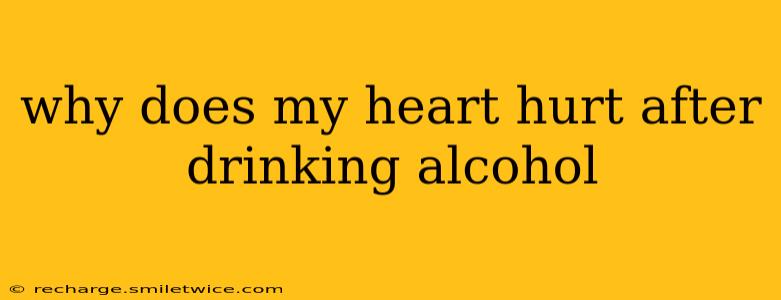Why Does My Heart Hurt After Drinking Alcohol?
Experiencing heart pain after drinking alcohol can be alarming, and it's crucial to understand the potential causes. While a mild, temporary discomfort might be relatively benign, persistent or severe pain warrants immediate medical attention. This comprehensive guide explores various reasons why your heart might hurt after consuming alcohol.
Understanding the Alcohol-Heart Connection:
Alcohol's impact on the cardiovascular system is complex and multifaceted. It can both positively and negatively affect heart health, depending on factors like the amount consumed, frequency of consumption, individual health conditions, and genetics. Let's delve into some key reasons for post-alcohol heart pain:
1. Cardiomyopathy (Alcohol-Induced Heart Muscle Disease):
This is a serious condition where alcohol damages the heart muscle, leading to weakening and enlargement. Symptoms can include chest pain, shortness of breath, palpitations, and fatigue. Chronic, heavy alcohol use is the primary culprit. The pain experienced can be a result of the weakened heart muscle struggling to pump blood effectively.
2. Arrhythmias (Irregular Heartbeats):
Alcohol can disrupt the heart's electrical signals, leading to irregular heartbeats (arrhythmias). These can range from harmless palpitations to potentially life-threatening conditions like atrial fibrillation. The feeling of a racing or fluttering heart, alongside chest discomfort, can be quite frightening. Arrhythmias can be triggered by even moderate alcohol consumption in susceptible individuals.
3. High Blood Pressure (Hypertension):
Alcohol consumption can elevate blood pressure, temporarily or chronically, depending on the amount and frequency of drinking. High blood pressure puts added strain on the heart, leading to chest pain or discomfort, particularly in individuals already predisposed to hypertension.
4. Coronary Artery Disease (CAD) Exacerbation:
If you already have coronary artery disease (narrowing of the arteries supplying the heart), alcohol can worsen symptoms. Alcohol can increase blood clotting and constrict blood vessels, reducing blood flow to the heart and triggering angina (chest pain).
5. Stress and Anxiety:
While not directly impacting the heart muscle, alcohol can exacerbate existing anxiety or stress. This psychological distress can manifest as chest pain or discomfort, mimicking cardiac symptoms. This is often associated with a feeling of tightness or pressure in the chest.
6. Acid Reflux (Heartburn):
Alcohol can relax the lower esophageal sphincter, allowing stomach acid to flow back into the esophagus. This acid reflux can cause a burning sensation in the chest, often mistaken for heart pain. This pain typically occurs in the upper chest and can be accompanied by a sour taste in the mouth.
7. Medication Interactions:
Certain medications can interact negatively with alcohol, potentially increasing the risk of heart problems or worsening existing conditions. Always consult your doctor or pharmacist about potential interactions between your medications and alcohol consumption.
8. Underlying Heart Conditions:
If you experience heart pain after drinking alcohol, and you have a pre-existing heart condition, it's particularly important to consult a doctor immediately. Alcohol may be exacerbating an already present cardiac issue.
When to Seek Immediate Medical Attention:
Do not hesitate to seek immediate medical attention if you experience:
- Severe, persistent chest pain.
- Chest pain accompanied by shortness of breath, sweating, nausea, or dizziness.
- Irregular or rapid heartbeat (palpitations).
- Sudden onset of chest pain, particularly after heavy alcohol consumption.
Disclaimer: This information is for educational purposes only and does not constitute medical advice. Always consult with a healthcare professional for any concerns regarding your health, particularly if you experience heart pain after drinking alcohol. They can accurately diagnose the cause and recommend appropriate treatment.
